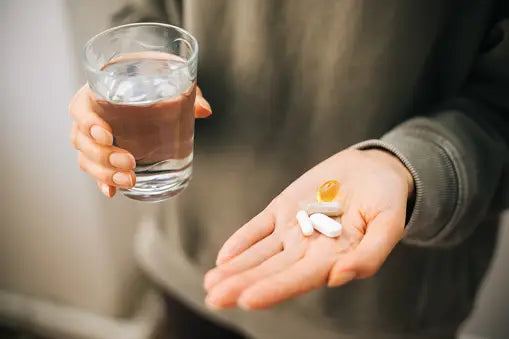

The Best Supplements to relieve Joint Pain
Table of Contents
The Best Supplements for Aching Joints
Just about every athlete will experience some kind of joint discomfort if they trains long enough. For most, its either the knee or elbow that will start aching after years of competitive sports or weight lifting. For years, there was only ibuprofen and aleve or pharmaceuticals, but these anti-inflammatory drugs are not without side effects.
The FDA recently released on their website a warning statement about the use of NSAIDS and their risks for heart disease and stroke. See the article here: FDA Drug Safety Communication: FDA strengthens warning that non-aspirin nonsteroidal anti-inflammatory drugs (NSAIDs) can cause heart attacks or strokes.
There is a safe alternative for athletes and fitness enthusiasts to use to avoid the dangerous side effects of NSAIDS for joint support, which is glucosamine sulfate. Glucosamine works by promoting the generation of ligaments, tendons, and cartilage. Glucosamine is not only responsible for stimulating the manufacture of substances necessary for proper joint function, it also is responsible for stimulating joint repair. Everyone knows that glucosamine is known for its joint support properties, but studies in animal models have shown that glucosamine can also increase lifespan! In roundworms, lifespan increased by 5%, while glucosamine supplementation lengthened the lives of 100-week old mice by 10%.
The study that is most exciting to lifters, is a 2010 study in which markers for cartilage turnover in patients with osteoarthritis (OA) of the knee, in response to muscle strength training in combination with treatment with glucosamine, ibuprofen or placebo. A 12-week double blind, placebo controlled, randomized study. Thirty-six elderly patients with bilateral knee osteoarthritis were randomly assigned to treatment with glucosamine, ibuprofen, or placebo during 12 weeks of strength training of both legs with focus on the quadriceps muscle. Strength tests (5 repetition maximum), blood and urine sampling were performed before and after the training period. The subjects trained 3 times a week. They cycled for 10 minutes and then trained their leg muscles on the leg-extension and leg-press machines. The ibuprofen group took 600 mg twice a day, and the glucosamine group took 500 mg of glucosamine sulphate three times a day. T
he researchers examined cartilage oligomeric matrix protein (COMP) in the subjects’ blood. Increased cartilage oligomeric matrix protein causes catabolic processes in the joints. At the end of 12 weeks, all three groups increased their muscle strength following 12 weeks of strength training. Serum COMP levels were reduced in the glucosamine-treated group after the training period, whereas they did not change in the two other groups. Glucosamine reduced COMP statistically significant compared to both placebo and ibuprofen; the mean reduction with glucosamine was 13% vs placebo and 17% vs ibuprofen. Serum COMP decreased significantly over the 12-week training period when treatment with glucosamine was added to the training regimen. This suggests an effect by glucosamine on the response of the osteoarthritis cartilage to a period of joint loading in humans with knee osteoarthritis.
| Glucosamine is a naturally occurring substance in the human body. It’s abundant in the joints. This compound is harvested from the shells of shellfish. When choosing a glucosamine based joint formula, it is imperative to use the glucosamine sulfate form, instead of just ordinary glucosamine. Glucosamine sulfate is stabilized with sodium chloride, also known as table salt. The sulfate part of glucosamine sulfate is the most important component. Sulfur is necessary for building and repairing cartilage. |
One of the best trials examining the effectiveness of glucosamine sulfate was a 3-year, double-blind study of 212 people with osteoarthritis of the knee. Participants receiving glucosamine showed reduced symptoms as compared to those receiving placebo. A similar study found that after monitoring symptom changes in subjects with osteoarthritis for 6 months while taking either acetaminophen, glucosamine, or a placebo, researchers found that the difference between acetaminophen and placebo was not significant, while glucosamine was found to reduce symptoms. In another study which compared glucosamine sulfate to ibuprofen (the active ingredient of Motrin, Advil, and Nuprin), pain scores decreased faster in the first 2 weeks in the ibuprofen group; however, by week 4, the group receiving the glucosamine sulfate was doing significantly better than the ibuprofen group.
| Petersen SG, Saxne T, Heinegard D, Hansen M, Holm L, Koskinen S, Stordal C, |
Christensen H, Aagaard P, Kjaer M. Glucosamine but not ibuprofen alters cartilage turnover in osteoarthritis patients in response to physical training. Osteoarthritis Cartilage. 2010 Jan;18(1):34-40.
Vaz AL; Double-blind clinical evaluation of the relative efficacy of ibuprofen and glucosamine sulfate in the management of osteoarthrosis of the knee in out-patients. Curr Med Res Opin 8;145-9, 1982.
D-Glucosamine supplementation extends life span of nematodes and of ageing mice. Sandra Weimer, Josephine Priebs, Doreen Kuhlow, Marco Groth, Steffen Priebe, Johannes Mansfeld, Troy L. Merry, Sébastien Dubuis, Beate Laube, Andreas F. Pfeiffer, Tim J. Schulz, Reinhard Guthke, Matthias Platzer, Nicola Zamboni, Kim Zarse, Michael Ristow Nat Commun. 2014 April 8; 5: 3563.
Reginster JY, Deroisy R, Rovati L, et al. Long-term effects of glucosamine sulphate on osteoarthritis progression: a randomised, placebo-controlled clinical trial. Lancet 2001;357:251-256.

















